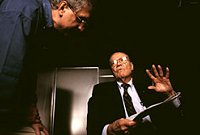Eleven Lessons from the Life of Robert S. McNamara

 MUST-SEE
MUST-SEE
 From an extended interview with former US Defence Secretary McNamara, filmmaker Morris has crafted a remarkable documentary that not only paints a complex portrait of this man, but also of America through the 20th century. And while it's unflattering (and scary), the film is so balanced and honest that it should be mandatory viewing in school history classes. Morris combines the lively interviews with archival film, stills and, most tellingly, recordings of White House conversations. This documentary evidence undermines many assumptions we've always had, showing a much more fallibly human side of the story. And indeed, this is McNamara's main theme: That we all make mistakes. Over and over and over again.
From an extended interview with former US Defence Secretary McNamara, filmmaker Morris has crafted a remarkable documentary that not only paints a complex portrait of this man, but also of America through the 20th century. And while it's unflattering (and scary), the film is so balanced and honest that it should be mandatory viewing in school history classes. Morris combines the lively interviews with archival film, stills and, most tellingly, recordings of White House conversations. This documentary evidence undermines many assumptions we've always had, showing a much more fallibly human side of the story. And indeed, this is McNamara's main theme: That we all make mistakes. Over and over and over again.
McNamara is exceptionally well-placed to comment on these events. At 85, he's lucid and witty, intelligent and self-deprecating, and blessed with a razor sharp memory. He's also a fantastic storyteller, giving detailed commentary about the end of the Great War, the Great Depression and World War II (during which he participated in perhaps the worst bombing campaign in human history--levelling 67 Japanese cities ... before dropping two nuclear bombs). He then took a job at Ford and made his fortune in the post-war boom before JFK tapped him to be defence secretary, a position he held through the Bay of Pigs, Cuban Missile Crisis and then, under Johnson, the escalating Vietnam War.
Morris manages to bring revelations into each of these events. This is a beautifully produced film, expertly edited with a haunting Philip Glass score and statistics that are meaningful and extremely disturbing. The most shocking chapter is the description of the fire bombing of Japan, during which McNamara admits that if the Allies had lost the war they would have been tried as war criminals, and rightly so. "But why is it moral because we won?" His comments on the Cold War and Vietnam are equally provocative, recasting the events through firsthand memories, new evidence and the gift of hindsight. And admitting openly that the world's leaders were often dead wrong. Thankfully, Morris uses a light hand when drawing parallels with these things and the current War on Terrorism. But the similarities are horrifying, especially in the fact that to the Cold War-obsessed Americans, Vietnam was about containing Russia and China. But to the Vietnamese it was a civil war; they were trying to break free of the Communist powers.
As McNamara concludes that in the fog of war, our judgement and understanding are simply not adequate: "We are the strongest nation in the world today, and I do not believe we should ever apply that economic, political or military power unilaterally. If we'd followed that rule in Vietnam, we wouldn't have been there. None of our allies supported us. If we can't persuade nations with comparable values of the merit of our cause, we'd better re-examine our reasoning."
 |
themes, violence | 26.Oct.03 lff |
with Robert S McNamara, Lyndon Johnson, John F Kennedy, Curtis LeMay, Franklin Delano Roosevelt, Barry Goldwater, Nikita Khrushchev, Richard Nixon, Fidel Castro, Woodrow Wilson, Tommy Thompson
release US 19.Dec.03; UK 2.Apr.04
Sony
03/US 1h46

So tell me: Morris and McNamara.
1: Empathize with your enemy.
2: Rationality will not save us.
3: There's something
beyond one's self.
4: Maximize efficiency.
5: Proportionality should be
a guideline in war.
6: Get the data.
7: Belief and seeing are
both often wrong.
8: Be prepared to re-examine
your reasoning.
9: In order to do good you may
have to engage in evil.
10: Never say never.
11: You can't change
human nature.
 Support Shadows: Buy a Poster
Support Shadows: Buy a Poster
|

 Still waiting for your comments ... don't be shy.
Still waiting for your comments ... don't be shy.